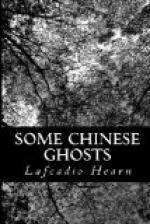[Illustration: Chinese calligraphy]
The Tale of the Porcelain-God
It is written in the FONG-HO-CHIN-TCH’OUEN_, that whenever the artist Thsang-Kong was in doubt, he would look into the fire of the great oven in which his vases were baking, and question the Guardian-Spirit dwelling in the flame. And the Spirit of the Oven-fires so aided him with his counsels, that the porcelains made by Thsang-Kong were indeed finer and lovelier to look upon than all other porcelains. And they were baked in the years of Khang-hi,—sacredly called Jin Houang-ti._
THE TALE OF THE PORCELAIN-GOD
Who first of men discovered the secret of the Kao-ling, of the Pe-tun-tse,—the bones and the flesh, the skeleton and the skin, of the beauteous Vase? Who first discovered the virtue of the curd-white clay? Who first prepared the ice-pure bricks of tun: the gathered-hoariness of mountains that have died for age; blanched dust of the rocky bones and the stony flesh of sun-seeking Giants that have ceased to be? Unto whom was it first given to discover the divine art of porcelain?
Unto Pu, once a man, now a god, before whose snowy statues bow the myriad populations enrolled in the guilds of the potteries. But the place of his birth we know not; perhaps the tradition of it may have been effaced from remembrance by that awful war which in our own day consumed the lives of twenty millions of the Black-haired Race, and obliterated from the face of the world even the wonderful City of Porcelain itself,—the City of King-te-chin, that of old shone like a jewel of fire in the blue mountain-girdle of Feou-liang.
Before his time indeed the Spirit of the Furnace had being; had issued from the Infinite Vitality; had become manifest as an emanation of the Supreme Tao. For Hoang-ti, nearly five thousand years ago, taught men to make good vessels of baked clay; and in his time all potters had learned to know the God of Oven-fires, and turned their wheels to the murmuring of prayer. But Hoang-ti had been gathered unto his fathers for thrice ten hundred years before that man was born destined by the Master of Heaven to become the Porcelain-God.
And his divine ghost, ever hovering above the smoking and the toiling of the potteries, still gives power to the thought of the shaper, grace to the genius of the designer, luminosity to the touch of the enamellist. For by his heaven-taught wisdom was the art of porcelain created; by his inspiration were accomplished all the miracles of Thao-yu, maker of the Kia-yu-ki, and all the marvels made by those who followed after him;—
All the azure porcelains called You-kouo-thien-tsing; brilliant as a mirror, thin as paper of rice, sonorous as the melodious stone Khing, and colored, in obedience to the mandate of the Emperor Chi-tsong, “blue as the sky is after rain, when viewed through the rifts of the clouds.” These were, indeed, the first of all porcelains, likewise called Tchai-yao, which no man, howsoever wicked, could find courage to break, for they charmed the eye like jewels of price;—




